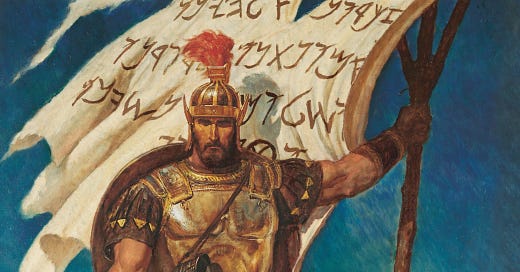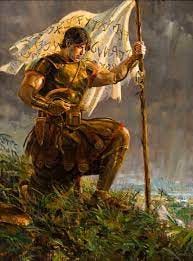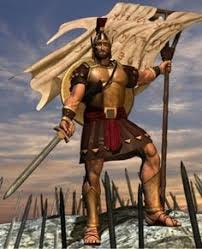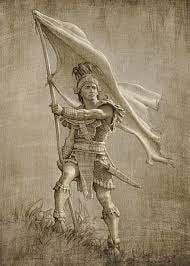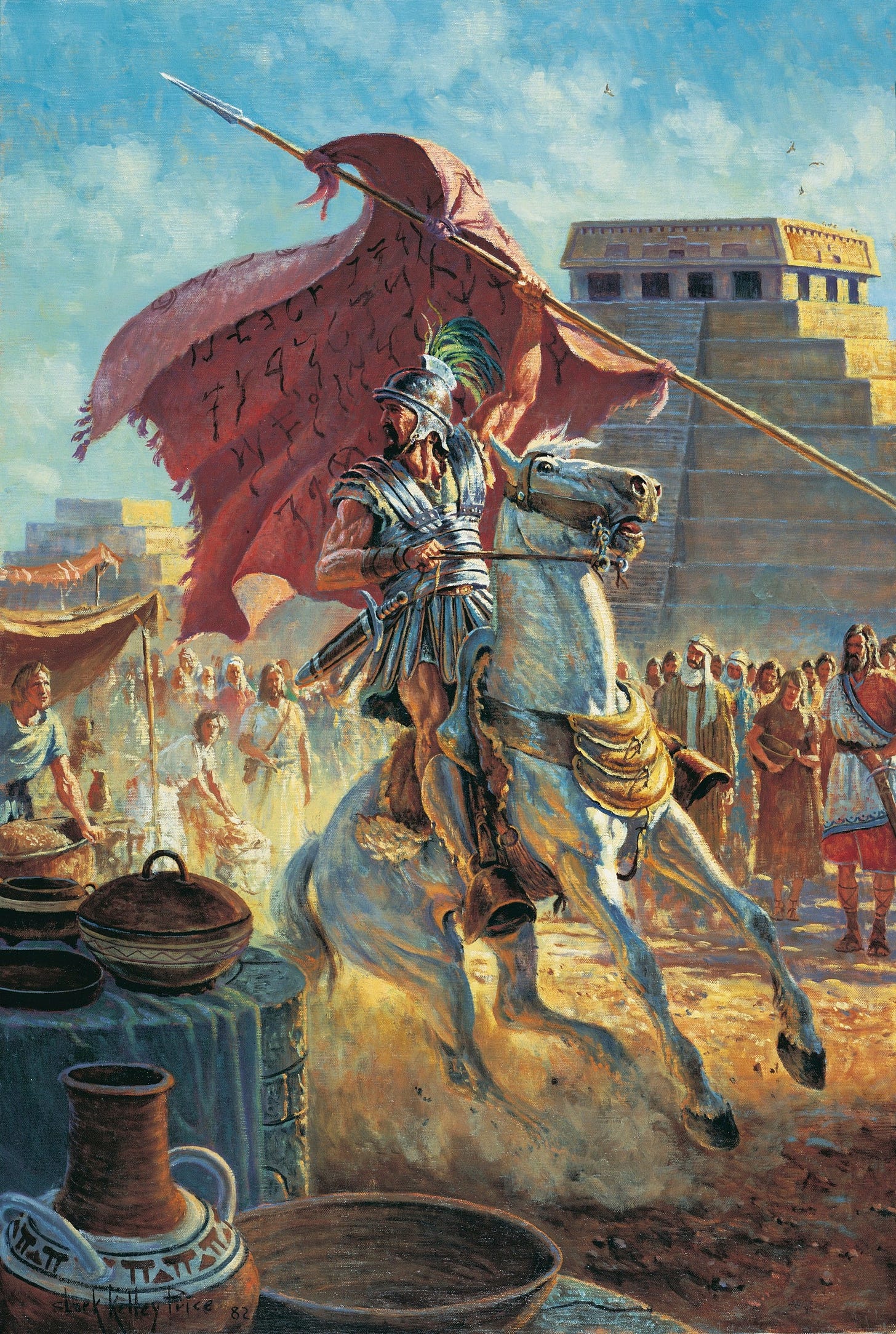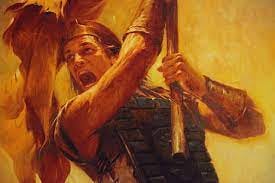In the Book of Helaman I am noticing a greater focus on memory. Mormon laments that the children of men tend to forget God very quickly. Chief Captain Moroni, or Chief Commander Moroni, remembers the teachings of his forefather Joseph. Of course the theme of memory is prominent throughout the Book of Mormon, but for some reason it stands out to me again here in Helaman’s record (still in the Book of Alma).
The Nephites, under Moroni’s valiant leadership, had just won a major victory over their enemies, and they had been praising God for delivering them from Lamanite oppression. It ought to have been a time of great peace, prosperity, and rejoicing, and in some sense it was. Helaman and his brethren had set the Church in order again, just as Alma, Helaman’s grandfather had done in the land of Zarehemla and the surrounding regions long before him. But not everyone was willing to listen to Helaman or to rejoice with Moroni. Why? Because they were seeking for power. They were not content to follow the Lord’s established order of rule through Helaman, the prophet, and his brethren, and through Moroni, their Chief Captain and Commander, and the higher judges who had been appointed by the voice of the people. Interestingly, the lower judges in the land were the primary culprits of power-seeking and the leaders who were most susceptible to the flattery of Amalickiah.
Why were these lower judges seeking for power? Why did they succumb to the flattery of Amalickiah? Amalickiah was a very wicked and cunning man who knew how to manipulate others who were seeking for power. Perhaps the lower judges envied the higher judges and those with more power and authority than they possessed. Perhaps they were seeking for ways to advance their careers. Amalickiah flattered them with promises of more power and authority if they would follow him and make him king. Amalickiah’s flatteries worked because as a power seeker himself, he knew what power-seekers wanted and how to deceive them. Is there anything in this portion of Mormon’s abridgment of the small plates that might apply to us in the Promised Land today? What kind of incentives are in place in most industries and institutions for people to advance in their careers? Do we simply honor industry, merit, excellence, hard work, and virtue, and promote those who are the best or the most capable in what they do? Or are people hired, promoted, and given positions of power based on other incentives, such as conformity to ideological demands of the ruling class?
Instead of lamenting how despicable the corrupt lower judges among the Nephites were to follow the flatteries of the tyrant and demagogue Amalickiah, might we not use the writings of Helaman as a kind of mirror in which to see ourselves in our own society? Which modern tyrants and demagogues flatter us with promises of power, prestige, popularity, and money if we conform to their ideological demands and promote their own campaigns for power? Are there Amalickiahs among us? Are there similar kinds of “lower judges” among us? If so, what might we learn from Moroni’s response to such power-seeking?
And now it came to pass that when Moroni, who was the achief commander of the armies of the Nephites, had heard of these dissensions, he was angry with Amalickiah. (Alma 46:11)
Moroni’s anger is more akin to the Lord’s righteous indignation when clearing out the money-changers from the Temple than it is to the wrath of Achilles, but there is heroic manliness and thumos in it that the Greeks would have admired. Especially after all of his diligent efforts and sacrifice, and after risking his own life in defense of the Nephites, Moroni, a great souled man, despised Amalickiah’s treachery. And Moroni wasn’t about to let Amalickiah get away with it. Moroni took immediate and decisive action:
And it came to pass that he rent his coat; and he took a piece thereof, and wrote upon it—aIn memory of our God, our religion, and freedom, and our peace, our wives, and our children—and he fastened it upon the end of a pole.
And he fastened on his head-plate, and his abreastplate, and his shields, and girded on his armor about his loins; and he took the pole, which had on the end thereof his rent coat, (and he called it the btitle of liberty) and he cbowed himself to the earth, and he prayed mightily unto his God for the blessings of liberty to rest upon his brethren, so long as there should a band of dChristians remain to possess the land—
For thus were all the true believers of Christ, who belonged to the church of God, called by those who did not belong to the church.
And those who did belong to the church were afaithful; yea, all those who were true believers in Christ btook upon them, gladly, the name of Christ, or cChristians as they were called, because of their belief in Christ who should come.
And therefore, at this time, Moroni prayed that the cause of the Christians, and the afreedom of the land might be favored.
And it came to pass that when he had poured out his soul to God, he named all the land which was asouth of the land bDesolation, yea, and in fine, all the land, both on the cnorth and on the south—A chosen land, and the land of dliberty.
And he said: Surely God shall not asuffer that we, who are despised because we take upon us the name of Christ, shall be trodden down and destroyed, until we bring it upon us by our own btransgressions.
And when Moroni had said these words, he went forth among the people, waving the arent part of his garment in the air, that all might see the writing which he had written upon the rent part, and crying with a loud voice, saying:
Behold, whosoever will maintain this title upon the land, let them come forth in the strength of the Lord, and aenter into a covenant that they will bmaintain their rights, and their religion, that the Lord God may bless them. (Alma 46:12-20)
Mormon paints such a vivid picture of this great man and his love for liberty. Can you picture Moroni as he rends his coat, writes upon a piece of it, fastens the piece to a pole, girds himself with armor, bows before God, prays for the cause of Christ and of liberty, names the chosen land and the land of liberty, proclaims his faith in Christ, and goes forth among the people with his title of liberty, rallying his people together to come forth in the strength of the Lord and enter into a covenant?
No painting can do this scene justice, but I love this mental image of Moroni with the title of liberty in hand as he rallies his people together to defend the cause of Christ and the cause of liberty. It reminds me of the words of the hymn:
Gather round the standard bearer;
Gather round in strength of youth.
Ev’ry day the prospect’s fairer
While we’re battling for the truth. (“O Thou Rock of Our Salvation”)
Christ is the Standard Bearer, and Moroni is a type of Christ as the bearer of the Title of Liberty.
I like these paintings, but they don’t quite capture what I see in my mind’s eye. These paintings come a little bit closer:
Captain Moroni was very young, very strong, very virile, and full of righteous indignation.
Moroni’s rally cry caused lovers of liberty to flock around him and they followed Moroni’s example, rending their garments as a token of the covenant that they made to be true to the Lord and to fight in defense of their God, their religion, their liberty, their homes, their wives, and their children.
The name “Christians” was imposed upon the true believers of Christ by the unbelievers, but the true believers in Christ gladly took upon themselves this name. Later, the Lord commanded that the Nephites call the Church by His name. Naturally this reminds me of President Nelson’s recent counsel that members of the Church of Jesus Christ of Latter-day Saints use the correct name of the Church:
The Lord has impressed upon my mind the importance of the name He has revealed for His Church, even The Church of Jesus Christ of Latter-day Saints. We have work before us to bring ourselves in harmony with His will. In recent weeks, various Church leaders and departments have initiated the necessary steps to do so. Additional information about this important matter will be made available in the coming months (Russell M. Nelson, in “The Name of the Church” [official statement, Aug. 16, 2018], mormonnewsroom.org).
Today I feel compelled to discuss with you a matter of great importance. Some weeks ago, I released a statement regarding a course correction for the name of the Church.1 I did this because the Lord impressed upon my mind the importance of the name He decreed for His Church, even The Church of Jesus Christ of Latter-day Saints.2
As you would expect, responses to this statement and to the revised style guide3 have been mixed. Many members immediately corrected the name of the Church on their blogs and social media pages. Others wondered why, with all that’s going on in the world, it was necessary to emphasize something so “inconsequential.” And some said it couldn’t be done, so why even try? Let me explain why we care so deeply about this issue. But first let me state what this effort is not:
It is not a name change.
It is not rebranding.
It is not cosmetic.
It is not a whim.
And it is not inconsequential.
Instead, it is a correction. It is the command of the Lord. Joseph Smith did not name the Church restored through him; neither did Mormon. It was the Savior Himself who said, “For thus shall my church be called in the last days, even The Church of Jesus Christ of Latter-day Saints.”4
Of course, Elder Nelson had already emphasized this important fact way back in 1990.
This counsel of our Prophet regarding this commandment from the Lord has been repeatedly emphasized. (See, e.g. here, here, and here)
There is so much more in this chapter, and so much more to write about the Title of Liberty. The Book of Mormon is inexhaustibly rich.


